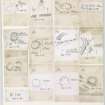Pricing Change
New pricing for orders of material from this site will come into place shortly. Charges for supply of digital images, digitisation on demand, prints and licensing will be altered.
Upcoming Maintenance
Please be advised that this website will undergo scheduled maintenance on the following dates:
Thursday, 9 January: 11:00 AM - 3:00 PM
Thursday, 23 January: 11:00 AM - 3:00 PM
Thursday, 30 January: 11:00 AM - 3:00 PM
During these times, some functionality such as image purchasing may be temporarily unavailable. We apologise for any inconvenience this may cause.
Overhowden
Henge (Neolithic) - (Bronze Age)
Site Name Overhowden
Classification Henge (Neolithic) - (Bronze Age)
Canmore ID 54577
Site Number NT45SE 10
NGR NT 4869 5227
NGR Description NT 4869 5227 and NT 487 524
Datum OSGB36 - NGR
Permalink http://canmore.org.uk/site/54577
- Council Scottish Borders, The
- Parish Channelkirk
- Former Region Borders
- Former District Ettrick And Lauderdale
- Former County Berwickshire
NT45SE 10 4869 5227.
(NT 4869 5227) Henge (NR) (site of)
OS 6" map (1970)
This Class I henge was excavated by Atkinson in 1950. He showed that it measured 320' in diameter across the crest of the bank, which is now only 1' high and spread to a width of over 20'. It had a ditch 12' wide and 4' deep within the bank, both interrupted by a NW entrance 30' wide, which is still recognisable according to Feachem, though the ditch is filled in and levelled.
R J C Atkinson 1952; R W Feachem 1963; RCAHMS 1915
In 1965, the site of this henge, on a gently sloping hillside, appeared only as a slight depression and change in colour of vegetation. It was under cultivation in 1975.
Visited by OS (EGC) 14 January 1965 and (BS) 1 August 1975
Photographed by the RCAHMS in 1976 and 1980.
Field Visit (April 1912)
30. Fort, Over Howden.
In arable land about 100 yards to the west of the steading of Over Howden, and at an elevation of some 900 feet over sea-level, are situated the remains of a circular fort measuring some 330 feet by 300 feet (fig. 12 [DP225485]). It is surrounded by one low broad rampart of earth, the deeper soil on the inner side of which indicates a trench.
Numerous flint arrow-heads have been found in the vicinity, including a number of the unusual hollow-based, lop-sided variety fashioned from black flint.
RCAHMS 1915 No. 30, visited April 1912.
OS Map: Ber., xiii. SW.
Sbc Note (21 March 2016)
Visibility: This was the site of an archaeological monument, which may no longer be visible.
Information from Scottish Borders Council
Previously also listed under duplicate site NT96SW 510 -CANCELLED. HES (LCK) 11.6.2024
































































































































